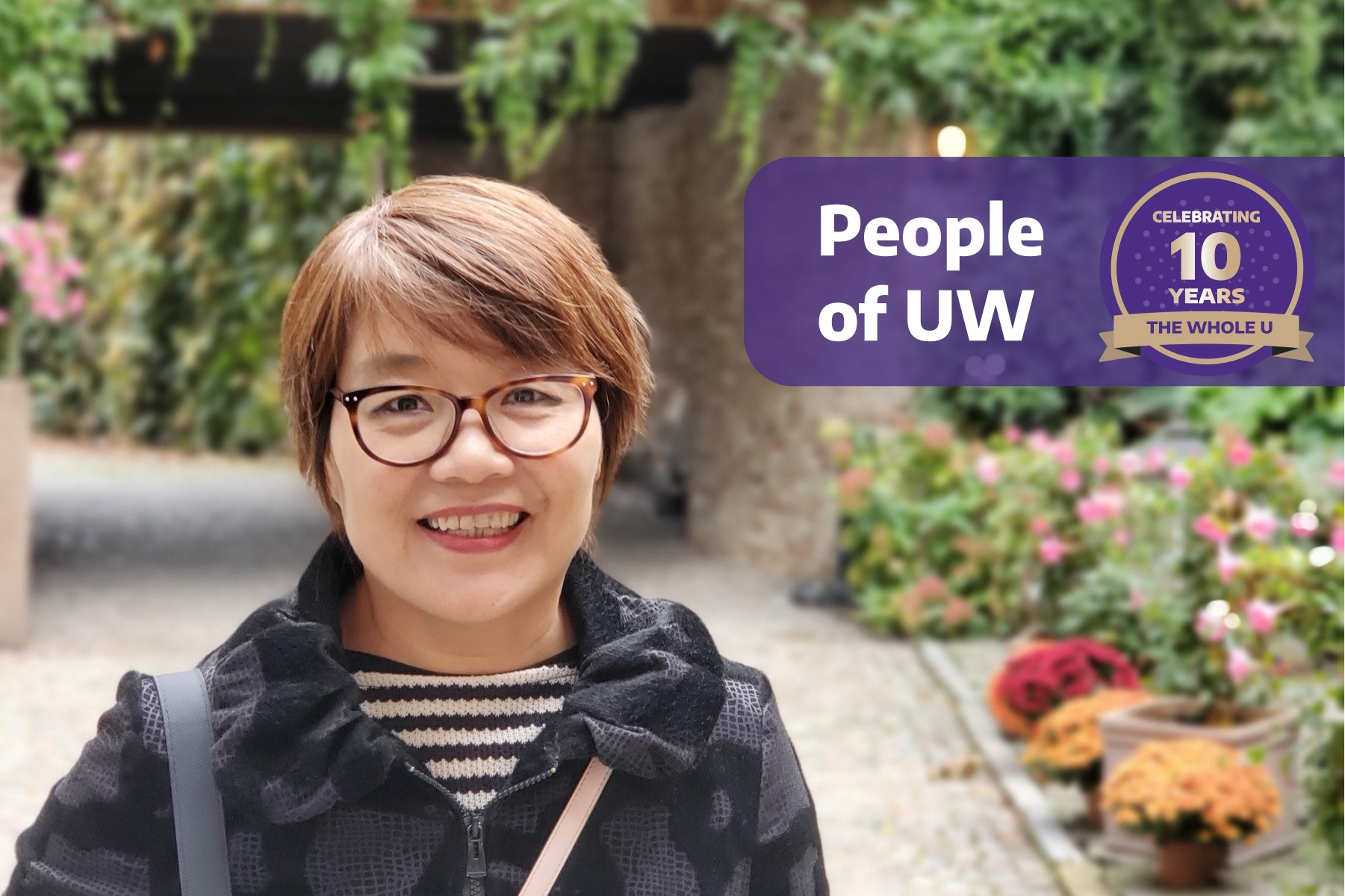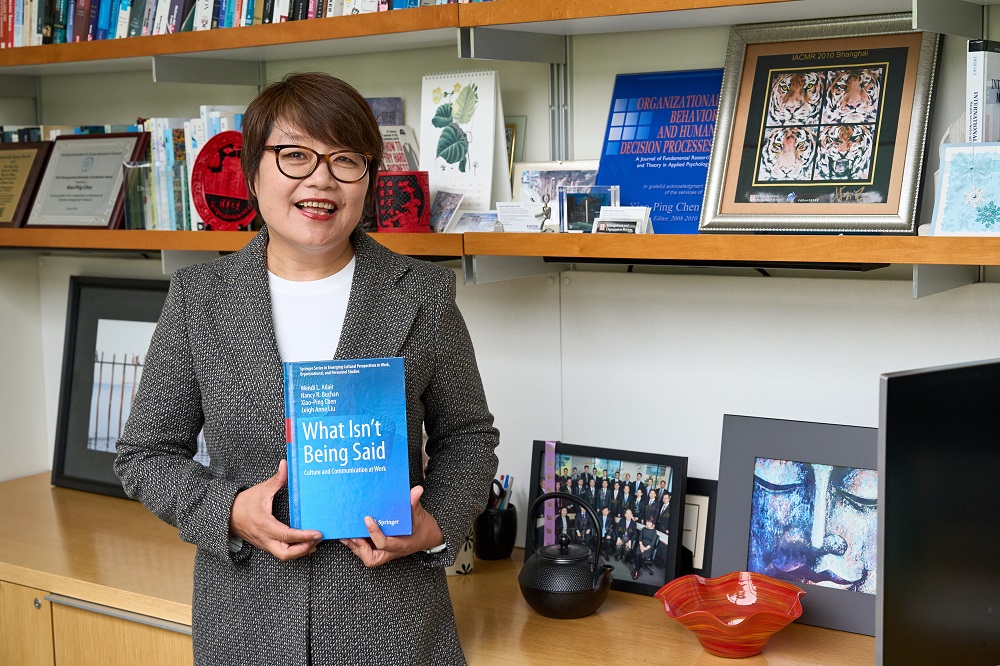
Xiao-Ping Chen connects people across cultures and communication styles
When teaching a course called “Leading Across Cultures,” Xiao-Ping Chen engages her students in a probing discussion of the 2020 Academy Award-winning documentary “American Factory.”
This uncommonly perceptive account of a Chinese glass manufacturer’s attempts to open a plant in Ohio is hardly a textbook MBA case study. But Chen, a professor of management at the UW Foster School of Business, believes there is a trove of lessons to be mined from the depicted efforts — sometimes in vain — to connect across cultures and communication styles. These skills are becoming essential in an increasingly global economy and increasingly diverse workplaces.
“I ask my students to analyze the film using what we learn about managing different cultural values and perspectives,” Chen says.
Many of those insights come from her own considerable body of research in organizational behavior that is influencing management practice around the world.
At a more personal level, she says, watching the film also takes her back to her own fitful days as a stranger in a strange land.
Culture shock
Chen’s brilliant academic career was forged in a state of acute culture shock.
She grew up in Hangzhou, in eastern China, a cosmopolitan city nestled against a poetic landscape of lucid waterways and lush mountains. “There’s a famous saying that every Chinese person knows,” she says. “If there’s a heaven in the sky, then there’s Hangzhou on earth.”
 After being raised and educated in this urban Eden, in 1989 Chen began doctoral studies in social and organizational psychology at the University of Illinois.
After being raised and educated in this urban Eden, in 1989 Chen began doctoral studies in social and organizational psychology at the University of Illinois.
Her first impression of the United States was not quite what she had envisioned in her dreams. “Champaign Urbana was so different from what I imagined about the U.S.,” she says. “It was surrounded by cornfields and the only tall building in sight was on campus.”
The unfamiliar locale was the least of Chen’s challenges. She discovered that her tastes, experiences, mannerisms, communication style and relationship to authority diverged from most of her peers. She found her classroom command of the English language to be sorely lacking in real-world practice. A perennial straight-A student, she scored a C on her first graduate school exam to her horror.
“I think I had the most severe culture shock a person could experience,” she says. “It made me ask, why am I here? My head was filled with soul-searching questions for a long time.”
Finding fertile grounding
Though it would take many years to feel fully comfortable in her adopted home and culture, Chen turned her initial days of alienation into academic inspiration.
During her time at Illinois, she connected with several renowned thought leaders in applied psychology, including James Davis (group decision making), Sam Komorita (social dilemmas) and Harry Triandis (cross-cultural psychology). Each helped Chen shape her research interests and encouraged her to develop new insights of her own.
 “I was so lucky to meet all these great scholars who I would never even have heard of if I had stayed in China,” she says.
“I was so lucky to meet all these great scholars who I would never even have heard of if I had stayed in China,” she says.
Finding a fertile grounding in the discipline of organizational behavior, Chen began her academic career at the newly established Hong Kong University of Science and Technology. There, she found another great mentor and collaborator in Anne Tsui, who was the editor of the influential Academy of Management Journal.
Three fruitful years later, Chen decided to return to the U.S. and Indiana University. One of the few Chinese faculty members there in the mid-1990s, she felt like something of a curiosity. Local media would often ask her for expertise she didn’t have on the Asian Financial Crisis.
Bloomington was a nice place to live and work. But Chen craved the energy of a bigger and more sophisticated city. When considering a position in the Foster School’s Department of Management and Organization, her sister, who worked at Microsoft at the time, closed the deal. “It’s beautiful here,” she said, as a pitch. “Just like our hometown.”
So much to discover
Chen found her groove at the UW. She gravitated to the study of psychology applied to organizational settings just as Seattle’s diverse economy was exploding to world-class status. “What interested me most was management, but from the psychological perspective,” she says. “How to communicate with people, how to lead and motivate them more effectively.”
 She spent the next 25 years exploring multiple aspects of this theme, across scores of academic papers and more than a dozen books — both in Chinese and in English.
She spent the next 25 years exploring multiple aspects of this theme, across scores of academic papers and more than a dozen books — both in Chinese and in English.
Chen has established the effects of passion, creativity, autonomy and authority in the workplace. Her deep dive into the practices that make Chinese entrepreneurs successful became her 2017 book, “Leadership of Chinese Enterprises.”
She has demystified guanxi, the essential and complicated commingling of business and personal relationships that drives Chinese culture and economics.
She has demonstrated that team cooperation can be induced by fostering strong group identity, building trust and making everyone feel their contribution has value.
And she has identified the factors that motivate people to go above and beyond at work—behavior known as organizational citizenship. These factors favor a leader who articulates a clear vision, challenges conventional thinking, fosters collaboration, sets high but realistic expectations and supports individual skills, needs and aspirations.
Cross-cultural communication
A major channel of Chen’s research is in identifying differing communication styles and understanding how they can interact better.
With collaborators Wendi Adair and Nancy Buchan, she co-founded a company called Intercultural Communication Edge (icEdge) and developed a “Myers-Briggs” type assessment of personal communication style. The icEdge tool measures across the dimensions of conversational directness (using explicit and direct language) vs. indirectness (using coded messages, facial expressions and body language to convey meaning), and the degree to which communication is guided by attention to contextual factors such as relationships, time and space.
 “These are great to know for self-awareness,” says Chen, who was raised in the more indirect communicating culture of China but now lives in the more direct culture of America. “The more important purpose is when you are working with other people who tend to communicate differently than you.”
“These are great to know for self-awareness,” says Chen, who was raised in the more indirect communicating culture of China but now lives in the more direct culture of America. “The more important purpose is when you are working with other people who tend to communicate differently than you.”
That is happening with increasing frequency, as “American Factory” demonstrates.
To help bridge these cultural differences, Chen has deeply investigated four components of cultural intelligence, or CQ, which is critical to modern global or diverse organizations. They are:
- Metacognitive CQ – the degree to which you encounter new information with an open mind and are willing to revise or modify prior assumptions about people of other cultures.
- Cognitive CQ – the level of knowledge you have about a different culture.
- Motivational CQ – the extent to which you are interested or willing to interact with people of different cultures.
- Behavioral CQ – your willingness to adjust behavior to meet another person’s cultural norms and preferences.
Many years of study of the intersection between culture and communication has led to the publication this spring of “What Isn’t Being Said: Culture and Communication at Work,” by Chen, Adair, Buchan and Leigh Ann Liu.
Leading thought from Seattle to Shanghai
Chen has earned many well-deserved awards and accolades for exceptional research, teaching, mentoring and leadership.
At the Foster School, she chaired the Department of Management and Organization during its ascension to the top echelon of management research faculties. “It was a great time to shape our very collaborative, collegial department into a world-class management research faculty,” she says.
 She also served four years in the critical role as associate dean for faculty and academic affairs. Since 2013, she has been the Philip M. Condit Endowed Chair in Business Administration.
She also served four years in the critical role as associate dean for faculty and academic affairs. Since 2013, she has been the Philip M. Condit Endowed Chair in Business Administration.
Beyond Foster, Chen has become a respected figure in the discipline of organizational behavior. She is a fellow of the Academy of Management, the American Psychological Association and the Society for Industrial and Organizational Psychology. She is editor of the journal Management and Organization Review and past editor of Organizational Behavior and Human Decision Processes.
But her influence is perhaps even greater in her home country. A past president of the International Association for Chinese Management Research (and recipient of its Distinguished Scholarly Contribution Award), Chen has published numerous management and leadership books for Chinese audiences, including multiple editions of “Managing Across Cultures.”
Perhaps most indelibly, she is the founding editor of Management Insights, a high-profile quarterly magazine published in Chinese — with an annual English edition — that carefully assembles and translates the discipline’s most relevant peer-reviewed research for managers and leaders. Think of it as the Harvard Business Review of China.
As with all Chen’s endeavors, Management Insights serves as a bridge between scholars and managers. And the movers and shakers of global superpowers, who tend to lack in cultural understanding and, increasingly, trust.
An artistic touch
As she has happily built a career and life, with her husband and two grown children, in the U.S., Chen sometimes reflects on the opposing forces that have shaped her. Her work has kept her feet planted in two worlds at once. And her artistic temperament helps process it all.
 That same boundless curiosity and intimate perception that has led her to so many insights on the most nuanced aspects of organizational behavior drives her many interests outside of work as well.
That same boundless curiosity and intimate perception that has led her to so many insights on the most nuanced aspects of organizational behavior drives her many interests outside of work as well.
Chen is keen-eyed (and widely traveled) photographer, occasional artist and expressive writer. She has authored several volumes of essays and poetry on an eclectic range of topics. “I don’t have any particular training,” she says. “I’m just interested in capturing beautiful things.”
On occasion, she has even penned a poem as preamble to a thematic issue of Management Insights, a lyric alternative to the customary — but usually forgettable — editor’s note. It’s something you’re not likely to see on the pages of Harvard Business Review.
“That’s true,” she confirms. “You won’t find a poem in the preface.”
Bridge builder
Chen recalls one particular poetic prelude of an issue that came in the chaotic early days of the Covid-19 pandemic. Though her art usually leans toward harmony and hope, this particular moment found her feeling pessimistic about the coming global response to this crisis.
“I wrote about what’s going to happen to the world,” she says. “When I read it today, I think I was right on.”
 Her prediction was the opposite of her hope that “the world would become more united by this tiny virus we were all facing,” she adds. “Instead, the world became more separated. And that’s very sad.”
Her prediction was the opposite of her hope that “the world would become more united by this tiny virus we were all facing,” she adds. “Instead, the world became more separated. And that’s very sad.”
But Chen doesn’t stay sad for long. The inherent optimism in her life’s work is the antidote to discord and distrust that pull us apart. She continues to discover ways to bring people together, through more empathetic leadership, more genuine passion, more perceptive communication and better understanding of our differences so that we can accomplish more together.
“I’ve always thought of myself as a bridge between all kinds of different people,” she says. “Students and faculty. Academics and practitioners. Managers and employees. Americans and Chinese. People from all different cultures. I try to be that bridge that people can use to connect with each other at individual and organizational levels.”
“What Isn’t Being Said” portrait by Paul Gibson. Other photos by Xiao-Ping Chen.
One Thought on “Xiao-Ping Chen connects people across cultures and communication styles”
On May 26, 2024 at 4:01 PM, Xiao-Ping Chen said:
Thank you, Ed, for writing such a nice article about me. I am so grateful!
Comments are closed.